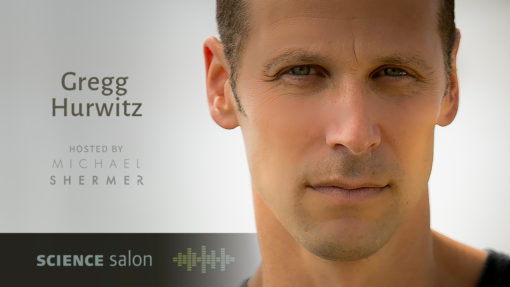
In Science Salon # 148, Michael Shermer reflects on the recent resurrection of Jordan Peterson, the resurgent criticism of him and why so many people attack him, why similar such unwarranted attacks have been made against other public intellectuals.


In Science Salon # 148, Michael Shermer reflects on the recent resurrection of Jordan Peterson, the resurgent criticism of him and why so many people attack him, why similar such unwarranted attacks have been made against other public intellectuals.

Ever since Bari Weiss introduced the world to the “Intellectual Dark Web” much has been written on what the members of the IDW believe. Pundits, journalists, and scholars have confidently espoused their “hot take” of the IDW without the slightest bit of systematic data collection to back up their claims. This empirical study of members of the IDW offers a preliminary summary of their beliefs on a wide range of issues.
Ever since Bari Weiss introduced the world to the “Intellectual Dark Web” much has been written on what the members of the IDW believe. Pundits, journalists, and scholars have confidently espoused their “hot take” of the IDW without the slightest bit of systematic data collection to back up their claims. This empirical study of members of the IDW offers a preliminary summary of their beliefs on a wide range of issues.
In this eSkeptic: Science Salon # 56: Dr. Tyler Cowen — How an Economist Views the World; Announcing Skeptic Magazine 24.1, Available Now in Print & Digital Editions; Behe’s Last Stand: The Lion of Intelligent Design Roars Again.

Shermer and Cowen discuss: the meaning of “on the margin” and “marginal utility” • trade wars and tariffs • Is Trump a savvy economist? • why capitalism is a moral system as well as an economic system • income inequality • universal basic income • regulating financial markets • immigration • libertarian paternalism • social media • governmental regulation • Jordan Peterson • governing mars and more…
In Science Salon # 51 Michael Shermer has a wide-ranging dialogue with New York Times bestselling author Gregg Hurwitz about myths, narratives, archetypes, and Trump.

Shermer and Hurwitz discuss: being a public intellectual • how to convey ideas through fiction vs. nonfiction • the role of myths and archetypes in narrative stories • Jordan Peterson and religion • the role of life experience and suffering in the development of a successful novelist, screenwriter, or filmmaker • the role of narrative in politics, and more…
In Science Salon AMA # 3, Dr. Shermer offers a brief summary of his current opinion of Jordan Peterson and then reads his essay: “Have Archetype — Will Travel: The Jordan Peterson Phenomenon”.

In Science Salon AMA # 3, Dr. Shermer offers a brief summary of his current opinion of Jordan Peterson and then reads his essay: “Have Archetype — Will Travel: The Jordan Peterson Phenomenon”.
In this article from Skeptic magazine 23.1 (2018) Ken Levy examines arguments put forth by theists that God’s existence is perfectly compatible with all the violence, pain, suffering, and premature death we experience.

Shermer reviews the latest issue of Skeptic magazine • introduces upcoming podcast guests Rachel Kleinfeld, Bruce Schneier, Mark W. Moffett, and Jared Diamond • discusses his book publishing plans for 2019, including an essay collection of his last 70 Scientific American columns • reflects on his 18 years writing for Scientific American and reads aloud the final column, titled “Stein’s Law and Science’s Mission”.
The New York Times calls him “the most influential public intellectual in the Western world right now.” He inspires heartfelt admiration or abject loathing, and very little in between. In these uncertain times it seems essential to have an opinion about Jordan Peterson. But Skeptic contributor Stephen Beckner can’t quite make up his mind.

The New York Times calls him “the most influential public intellectual in the Western world right now.” He inspires heartfelt admiration or abject loathing, and very little in between. In these uncertain times it seems essential to have an opinion about Jordan Peterson. But Skeptic contributor Stephen Beckner can’t quite make up his mind.
Have Archetype—Will Travel by Michael Shermer attempts to explain the startling phenomenon of Jordan Peterson; not the man’s ideas so much as his message and following, which has grown astronomically in the past two years, from obscure Canadian professor of psychology to international man of mystery: mysterious to nearly everyone, that is, on exactly what it is he believes.

Michael Shermer attempts to explain the startling phenomenon of Jordan Peterson; not the man’s ideas so much as his message and following, which has grown astronomically in the past two years, from obscure Canadian professor of psychology to international man of mystery: mysterious to nearly everyone, that is, on exactly what it is he believes.

Science writer and weekly advice columnist Amy Alkon debunks widely-accepted but scientifically unsupported notions about self-esteem, shame, willpower, and more and demonstrates that thinking your way into changing (as so many therapists and self-help books advise) is the most inefficient way to go about it. Shermer and Alkon also get into the #metoo movement, evolutionary psychology, politics, depression, suicide, Jordan Peterson, and other fascinating topics.
In Science Salon # 31, Michael Shermer talks with the science writer and weekly advice columnist Amy Alkon about her new book, Unf*ckology: A Field Guide to Living with Guts and Confidence.

Jonathan N. Stea avers that the self-help material that psychologist Jordan Peterson provides to the masses mirrors the principles found in evidence-based clinical psychological literature.
Whether at home or on the go, the SKEPTIC App is the easiest way to read your favorite articles. Within the app, users can purchase the current issue and back issues. Download the app today and get a 30-day free trial subscription.







